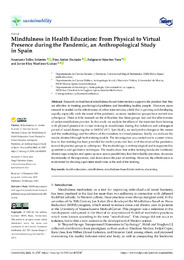Título :
Mindfulness in Health Education: From Physical to Virtual
Presence during the Pandemic, an Anthropological Study
in Spain |
Autor :
Téllez Infantes, Anastasia 
Anton, Fina 
Sánchez Vera, Fulgencio 
Martínez Guirao, Javier Eloy  |
Editor :
MDPI |
Departamento:
Departamentos de la UMH::Ciencias Sociales y Humanas |
Fecha de publicación:
2022-02 |
URI :
https://hdl.handle.net/11000/31234 |
Resumen :
Research on traditional mindfulness-based interventions supports the position that they
are effective in treating psychological problems and benefiting healthy people. However, more
research is needed on the effectiveness of online interventions, a field that is growing and developing
rapidly, especially with the onset of the pandemic, as many meditation groups have moved into
cyberspace. There is little research on the difficulties that these groups face and the effectiveness
of online mindfulness practice. In this work, we analyze the effects of the transition from training
with physical presence to virtual training in mindfulness during the lockdown and subsequent
period of social distancing due to SARS-CoV-2. Specifically, we analyze the changes in the means
and the methodology and the effects of the transition to virtual presence; finally, we evaluate the
results obtained through both training models. The investigation was carried out in a center where
face-to-face training has been provided for twelve years and that, with the onset of the pandemic,
moved its practice groups to cyberspace. The methodology is anthropological and is supported by
quantitative and qualitative techniques. The results show that online training breaks the traditional
chrono-topo complex and opens up new access possibilities, but limits bodily practices, decreases
the intensity of the experience, and slows down the pace of learning. However, the effectiveness is
maintained by showing equivalent result rates at the end of the training
|
Palabras clave/Materias:
health education
mindfulness
mindfulness-based intervention
eLearning |
Área de conocimiento :
CDU: Antropología |
Tipo de documento :
info:eu-repo/semantics/article |
Derechos de acceso:
info:eu-repo/semantics/openAccess
Attribution-NonCommercial-NoDerivatives 4.0 Internacional |
DOI :
https://doi.org/10.3390/su14052547 |
Aparece en las colecciones:
Artículos Ciencias Sociales y Humanas
|
 La licencia se describe como: Atribución-NonComercial-NoDerivada 4.0 Internacional.
La licencia se describe como: Atribución-NonComercial-NoDerivada 4.0 Internacional.
.png)
